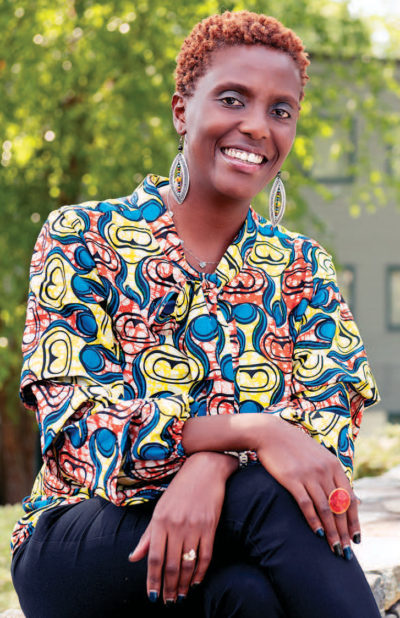When growing a business, it’s never too late to have an epiphany, says Waceke Nduati. The Nairobi, Kenya, entrepreneur had hers after already spending 10 years building her business, Centonomy, which teaches clients about personal finance and wealth creation. She was attending the 2017 on-campus session of “Launch and Grow: The Kenyan Women’s Entrepreneurial Leadership Program,” hosted by Babson Executive and Enterprise Education since 2016. The 10-month program—an initiative of the Madrid-based Women for Africa Foundation, in association with Babson and Banco Santander—brings 20 Kenyan businesswomen to campus for a week in June, followed by online learning and support.

Photo: Webb Chappell
Waceke Nduati has been a participant and an instructor in the “Launch and Grow” program.
“At Babson, I had an ‘aha moment,’” Waceke says. “Women carry a lot of ‘we’re not good enough,’ no matter what fantastic things we’ve done. But I realized, ‘My goodness, I am enough.’ You leave Babson knowing you are enough.”
And that is more or less the point of the program, says Susan Duffy, executive director of the Center for Women’s Entrepreneurial Leadership, who co-leads the program with Mary Gale, senior lecturer of entrepreneurship. “A lot of what we’re doing,” says Duffy, “is opening thinking around how big and bold you can be, to really change expectations around what kind of impact you can have.”
Participants have represented a range of industries, from sports to fashion to marketing to food. They face many of the same challenges that entrepreneurs often confront, but, as women and Kenyans, they encounter other obstacles as well. For example, Waceke explains, “Historically, women have not been inheritors of property and do not have the traditional security that banks want.” Hence, just obtaining a loan can be difficult.
The program offers concrete skill building, with classes on pitching, operations, and finance. But what Duffy describes as “Babson’s special sauce” is the ability to create an environment that promotes what she calls “self-efficacy.” The women test and try ideas, learn from not just the faculty but their cohort, share stories, help ease one another’s anxieties, and act as champions for one another. “Those elements combine to create an environment where people say, ‘I’ve got this.’ That’s self-efficacy,” Duffy says. “They might come in thinking, ‘Well, I have this business,’ but they leave thinking, ‘I’m just getting started; the sky’s the limit.’”
Waceke says she joined the 2017 cohort because she wanted to be in a different environment and gain new perspectives. “I was at that stage where I was tired of hearing my own voice,” she says. The program made her realize that her organization needed a cultural shift. “I cannot be the only entrepreneur in the company,” she says. “I had to create an entrepreneurial culture. Setting up ET&A was the first thing I did when I came back.”
This year, Waceke returned to the program as an instructor, co-teaching a session with Mary Gale. Waceke was excited to help her countrywomen undergo the process she found so invaluable. “The program showed me how to think like a leader,” she says. “It is really transformational.”—Jane Dornbusch
